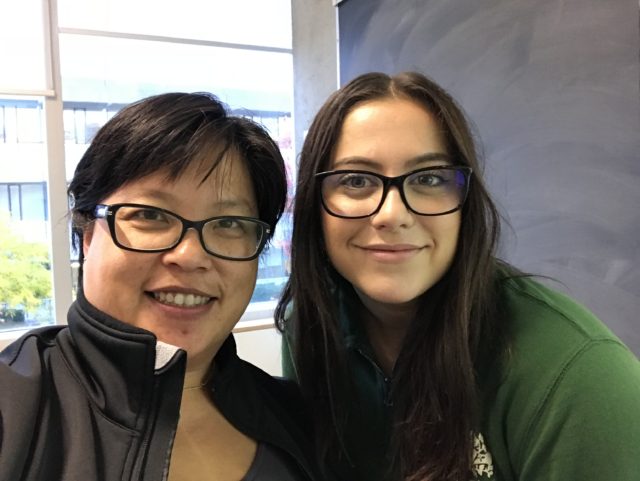Getting Our Groove

Week 7 – EDUC471D100 – October 20, 2017
Guess which one is me? Nice pictures. Another “drawing” warm-up activity for EDUC471. This week the rationale or learning intention was different from the last. This time we were randomly assigned partners in the class and our objective was to draw one another. Yeesh. There is a reason why I become a math teacher versus an art teacher. Anyway, it reminds me of the Wild Card activity about the right and left brain. I have preferences.
We did not find out the learning objective of the activity until the very end. It was so fascinating to be an observer. I was listening to the class during the activity. There was my favourite classroom HUM where we are talking to each other… and then, it got really quiet. I was a little spooked by it. The activity intended for us to get to know someone else in the classroom a little bit better. We tend to sit in the same spots in the room and I realized that the talking was the “getting to know you” better. I wanted to get to know my partner a little bit more before drawing her. We took a selfie to compare. See below.
This week’s class was about grading and how that influences curriculum, curriculum development, and curriculum implementation. Grading has it’s limitations, even though it serves a system purpose. This is a topic I am passionate about. My students picked up this vibe, I’m sure, during the class. This is why I am so grateful and I am a huge advocate for BC’s New Curriculum. With an emphasis on a competency-based curriculum, more flexibility can be applied to personalize learning and engage in inquiry. Its an opportunity to give students choice and empower them in their learning and what they are learning about. Here are my responses to the journal reflection questions.
Journal Reflection Questions – Grading & Curriculum
What are your thoughts on grades and report cards?
I’m not a big fan. I understand that we have been brought up with and have been accustomed to grading and the accumulation of grades but a letter or a number cannot describe student learning to the student, parent, or other teachers. What does an “A” represent? What can a student learn from getting an “A”? Do all A’s mean the same in every class? I wonder about that but also wonder about how the grading process hinders student learning and possibly minimizes the potential of any given curriculum. How can we escape the rituals of grading and focus more on student learning?
What would communicating student learning look like?
I love the idea of ongoing formative assessment and using technology to achieve this. Although I have not used FreshGrade as a K-12 educator, I love the premise behind it. The teacher, student, and parent can all be engaged with the DIALOGUE of student learning. It would be an app on my phone where I would get notifications (as a parent) and be able to respond to or comment on my daughter’s learning/progress/achievement. I can ask questions to the teacher. It would be like Facebook but even better. It’s an opportunity for my daughter to celebrate her learning and be in charge of choosing exemplars that best depicts her learning. The teacher would share their expertise and provide formative feedback or commentary that supports student learning. I like the immediacy and it could possibly eliminate the parent/teacher meeting or how it’s constructed. I like the student in control and all 3 of us working as a team.
What do students, teachers, and parents need to know about student learning as it relates to curriculum?
I would love to see PROGRESS over time. Where did my daughter start, where is she going, how is she doing, and how can she get to where she is going? I would love to know about my daughter’s strengths and how she uses them in different subject areas or in her learning. I would love to know more about my daughter as a person… and how this reflects the core (and curricular) competencies. I would love to see student self-reflection and how she sees herself as a learner. Is she meeting expectations? If so how? Where can she improve? What strategies can she implement? In the end, I would love the opportunity to witness/observe the before and after with exemplars of her work.
What is the difference between student learning and student achievement? Which is more important?
What a loaded question. Thank you. I made it myself. Well… student learning is about the process and student achievement is about the end point or end of the learning process. Based on the way that school systems are constructed and accustomed to, it is highly likely perceived that student achievement is important… to get promoted to the next grade or get into post-secondary education. But I wonder about the “efficiency” of education. I have had students in my math class before who could “study” to get an “A” in my class and have no understanding of the course content. This is alarming and I was a part of that teaching and learning process. I do hope that we can shift our value towards student learning and our growth is ongoing and unlimited. It’s more about learning about our learning, or metacognition, and developing the competencies via course content that will help all learners thrive in an area of passion and interest. This is where BC’s New Curriculum has potential and I hope that K-12 educators can embrace this opportunity.
MY REFLECTION
What a strange week… it’s unlike me to post my reflection the night before my class… while having to catch the ferry in only a few hours. Although I would like to see a full-attendance in my class, I understand that it’s the time for illness, major assignments, and well LIFE. That said, we are getting our groove in this course. I felt compelled during the class to RANT, a bit… I was so triggered during the week about assessment & evaluation and how that affects student learning, but also curriculum and how it’s delivered and received. Assessment & evaluation need to be aligned with curriculum.
I’m hoping that my students feel that way about this class, how they are assessed, and what they are learning. It can seem almost vague, confusing, and messy at times… and it’s suppose to be. I find it curious when everything that we learn or experience is predicable and portable. How can learning fit exactly into a rubric or letter grade? And how can I endorse personalized learning if I had a final exam at the end of the course? It seems challenging to me and I want my students to experience choice, investigate an area of interest, and be the teacher and learner. I believe they are one.
I was pretty happy with the reading summaries, wildcard activity, and closing activity. Students were activated in their learning and I LOVE how they learn with and from each other. The wildcard activity spooked me out a bit because it was one of those psychology games where we had to imagine being in a maze. After answer a few prompts, I learned that my problems are HUGE and INFINITE… and I how I approach my problems is by looking at them. That said, I did learn that the most important person in my life is my daughter. That was a good thing. The class ended with a fun (math like) game where probability and MORE psychology was required. There were PRIZES… ah yes, back to the goods external. Nothing wrong with prizes as long as it’s not bonus marks. LOL.
